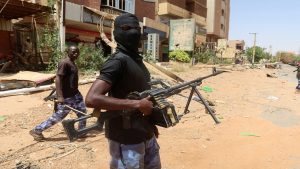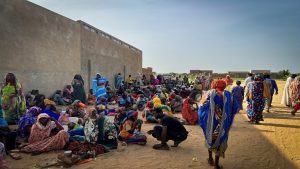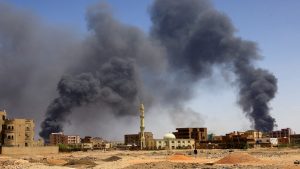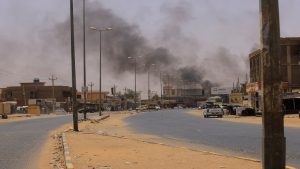Sudan’s government and rebel groups in Darfur agreed on Tuesday that all those wanted by the International Criminal Court (ICC) should appear before the tribunal, but a lawyer for ousted president Omar al-Bashir rejected the plan.
Bashir, who was toppled after mass protests last year, is wanted by the ICC for war crimes, genocide and crimes against humanity, but Information Minister Faisal Saleh did not specifically name him when announcing the move.
The government and the rebel groups reached an agreement during a meeting in South Sudan’s capital Juba that included “the appearance of those who face arrest warrants before the International Criminal Court,” said Mohamed al-Hassan al-Taishi, a member of Sudan’s sovereign council.
Taishi also said that the two sides agreed to create a Darfur special court to investigate and hear cases including those investigated by the ICC. That could suggest that some will be tried in Sudan but no details were immediately available.
Bashir’s lawyer said the ex-president refused to have any dealings with the ICC because it was a “political court”.
Bashir has said the allegations made by the ICC, the world’s first permanent court for prosecuting war crimes, are part of a Western conspiracy.
A spokesman for the ICC declined to comment. The Hague-based court issued its first arrest warrant for Bashir in 2009, its first for a sitting head of state and a year later issued a second one.
Bashir faces five counts of crimes against humanity for murder, forcible transfer, extermination, torture and rape, two counts of war crimes for attacks against civilians and three counts of genocide for killings and creating conditions meant to bring about the destruction of the targeted group, allegedly committed between 2003 and 2008 in Darfur.
Sudan’s civilian government, which is running the country under a three-year transition with the military, has been seeking to make peace with rebels in Darfur and other neglected regions which had been fighting Bashir’s government for years.
Darfur rebels and residents have long demanded that Bashir should be tried. Conflict spread in the impoverished western region in 2003 after mostly non-Arab rebels rose up against Khartoum. Government forces and mainly Arab militia mobilised to suppress the revolt were accused of widespread atrocities and genocide.
West Darfur had been largely calm since 2010, though there have been occasional skirmishes over the past three years.
Violence in the West Darfur region in January has killed at least 65 people and wounded more than 50, as well as displacing thousands, an international peacekeeping mission said.






